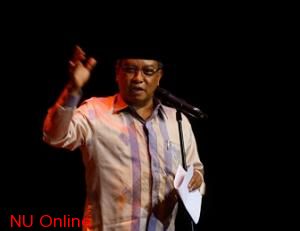'Corruption could be eradicated through sufi teachings'
NU Online · Jumat, 4 Oktober 2013 | 23:11 WIB
Jakarta, NU Online
Among the factors causing the crisis in the country are increasingly widespread practices of corruption by its elites. One of the efforts to eradicate corruption is by increasing spirituality through sufi teachings.<>
General Chairman of the Central Board of Nahdlatul Ulama (NU) KH. Said Aqil Siroj made the remarks at a religious gathering held at the Jakarta's Al-Tsaqafah Ciganjur Luhur Islamic boarding school (pesantren) on Friday (4/10).
"Ministers have adequate salaries, regents' (cars) gasoline is guaranteed, their maids and drivers are all paid by the government. The ministers have a special staff, expert staff, assistants, deputies, private secretary, their need of gasoline and home cooks have been affroded by the government," he said.
Apparently, Kiai Said added, they had still felt poor. "If they always feel poor, they are far from the sufi characters. On the contrary, if they have the feeling of contentment (qanaah) and thankfulness, they would not commit corruption," he said .
According to him, instead of causing the decline of Islam, "tasawuf (sufism) has encouraged human qualities into a dynamic spirit and even the rise of Islamic civilization coincides strongly with the spread of sufi teachings."
"Sufism will not make man confused, sad in dealing with any complicated matter. It will just make man sad because of God. What causing the decline of Islam is loving most wordly life (hubbu dunya), competing for position and properties, plagued by fear of hunger and poor and fear of death," he added.
If the officials and leaders of this country had high spiritual quality, they would avoid corruption, and to get such quality it could be reached through sufi teaching, he said.
Indonesia is consistently ranked one of the most corrupt countries in the world.
In Transparency International's annual Corruption Perceptions Index, Indonesia last year came in 118th out of 176 countries and territories. A number one ranking means the least corrupt.
And it is not just high-ranking officials who are accused of taking kickbacks -- corruption is endemic at all levels and is widely viewed as having crippled the public sector.
From paying police small amounts for minor traffic offences to immigration officials extorting bribes from foreigners at airports, graft is part of everyday life in Indonesia, critics say.
Indonesia has made efforts to tackle the problem over the past decade, in particular with the establishment of powerful anti-graft agency the Corruption Eradication Commission (KPK).
The KPK, which has been operating since 2003, has been granted extraordinary powers, including wire tapping suspects and probing bank accounts, and has succeeded in sending top officials and business people to prison.
Reporting by Aiz Luthfi; Editing by Sudarto Murtaufiq
Terpopuler
1
Khutbah Jumat: Ramadhan dan Kesempatan yang Tidak Selalu Terulang
2
Innalillah, Ulama Mazhab Syafii asal Suriah Syekh Hasan Hitou Wafat dalam Usia 83 Tahun
3
Kultum Ramadhan: Lebih Baik Sedikit tapi Istiqamah
4
Keluar Mani yang Tidak dan Membatalkan Puasa
5
Khutbah Jumat: Ramadhan, Melatih Sabar, Memperkuat Syukur
6
Khutbah Jumat: Tiga Kebahagiaan Orang Puasa
Terkini
Lihat Semua
















